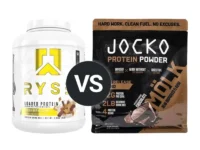Knowledge BaseYou're Questions Answered
What is in protein powder?
Protein powder is a dietary supplement that is made from a variety of protein sources, such as:
- Whey protein: This is one of the most common types of protein powder and is derived from dairy. Whey protein is a complete protein, meaning that it contains all of the essential amino acids that the body needs to function properly. Whey protein is also easily absorbed by the body, making it a popular choice for post-workout recovery.
- Casein protein: This is another type of protein powder that is derived from dairy. Casein protein is a slow-digesting protein, meaning that it provides a steady supply of amino acids to the body over a longer period of time. Casein protein is often used before bed to support muscle recovery and growth while the body is at rest.
- Soy protein: This type of protein powder is derived from soybeans and is a popular choice for individuals following a vegetarian or vegan diet. Soy protein is a complete protein and is easily digestible.
- Pea protein: This type of protein powder is derived from yellow peas and is also a popular choice for individuals following a plant-based diet. Pea protein is a complete protein and is easily digestible.
- Egg white protein: This type of protein powder is derived from egg whites and is a complete protein. It is easily digestible and is often used by bodybuilders and athletes to support muscle building and recovery.
- Rice protein: This type of protein powder is derived from brown rice and is a complete protein. It is easily digestible and is often used by individuals following a vegetarian or vegan diet or those with allergies or sensitivities to dairy or soy.
In addition to protein, protein powders may also contain other ingredients, such as artificial sweeteners, flavors, colors, thickeners, enzymes, vitamins, minerals, and fillers. These perform several jobs from providing flavor, sweetening, and agents to aid with mixing or to prevent clumping as well as digestive enzymes. Many protein powders also contain additional substances that can aid with your workout routine or diet. Vitamins and minerals are sometimes added as well as prebiotics and probiotics.
It's also important to keep in mind that the protein content and quality of protein powders can vary widely, so it's important to choose a product that provides a good source of high-quality protein and to consult with a healthcare professional or a registered dietitian before starting to use protein powder, especially if you have any medical conditions or are taking any medications.
Related Questions
Related Reviews
Protein vs Protein
Your Answer
We are a participant in the Amazon Services LLC Associates Program, an affiliate advertising program designed to provide a means for us to earn fees by linking to Amazon.com and affiliated sites.

